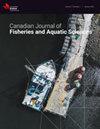明确将基于生态系统的渔业管理纳入管理战略评估,重点是小型中上层鱼类
IF 2.2
2区 农林科学
Q2 FISHERIES
Canadian Journal of Fisheries and Aquatic Sciences
Pub Date : 2023-10-05
DOI:10.1139/cjfas-2023-0092
引用次数: 0
摘要
人们普遍认识到,需要从传统的单一物种渔业管理方法转向基于生态系统的渔业管理(EBFM)或生态系统的渔业方法。考虑到小型远洋饲料鱼的关键生态作用,在考虑对具有经济价值的渔业采取管理行动时,EBFM尤为重要。管理战略评估(MSE)是推动EBFM定量实施的有效方法,它使利益相关者能够探索竞争生态系统相关目标之间的权衡。本文利用已有的数据和研究,提出了六种不同的方法来推进具有MSE显式性的EBFM,并指导未来的研究。这些方法可以分为以下几种:(i)涉及运营模式和/或直接与运营模式挂钩,同时可能提供额外的绩效指标来评估生态系统目标;(ii)可以纳入绩效指标;(iii)涉及管理程序的收获控制规则。该综述表明,即使没有复杂的、数据丰富的生态系统操作模型,也可以立即采取措施实施针对定量战术管理的EBFM。本文章由计算机程序翻译,如有差异,请以英文原文为准。
Explicitly Incorporating Ecosystem-Based Fisheries Management into Management Strategy Evaluation, with a focus on Small Pelagics
The need to transition from traditional single-species fisheries management approaches towards ecosystem-based fisheries management (EBFM), or an ecosystem approach to fisheries, is widely recognised. EBFM is particularly important when considering management actions for economically valuable fisheries for small pelagic forage fish, given their key ecological role. Management strategy evaluation (MSE) is an effective approach to advance the quantitative implementation of EBFM by enabling stakeholders to explore trade-offs among competing ecosystem-related objectives. This paper puts forward six different approaches to advance EBFM with MSE explicity, by taking advantage of data and research already available and by guiding future research. These approaches can be grouped into those which (i) involve the operating model and/or link directly to the operating model while potentially providing additional performance metrics to evaluate ecosystem objectives, (ii) can be incorporated into the performance metrics, and (iii) involve the harvest control rule of the management procedure. This review demonstrates that immediate steps can be taken to implement EBFM targeted at quantitative tactical management, even without a complex, data-rich ecosystem operating model.
求助全文
通过发布文献求助,成功后即可免费获取论文全文。
去求助
来源期刊

Canadian Journal of Fisheries and Aquatic Sciences
农林科学-海洋与淡水生物学
CiteScore
4.60
自引率
12.50%
发文量
148
审稿时长
6-16 weeks
期刊介绍:
The Canadian Journal of Fisheries and Aquatic Sciences is the primary publishing vehicle for the multidisciplinary field of aquatic sciences. It publishes perspectives (syntheses, critiques, and re-evaluations), discussions (comments and replies), articles, and rapid communications, relating to current research on -omics, cells, organisms, populations, ecosystems, or processes that affect aquatic systems. The journal seeks to amplify, modify, question, or redirect accumulated knowledge in the field of fisheries and aquatic science.
 求助内容:
求助内容: 应助结果提醒方式:
应助结果提醒方式:


